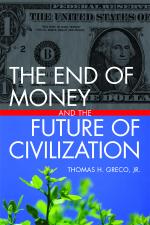The End of Money and the Future of Civilization
(this article was first published in September 2009. It has been revised and updated in March 2010)

Large parts of our economy appear set to go belly-up. The banking system, which should be of service to the productive economy, is itself on the verge of collapse. Speculators who brought those banks to the brink by pushing "creative" investment opportunities are being lavishly rewarded with bail-out funds amounting to huge gifts that are ultimately being financed by the tax payers.
Unless we want to spend the rest of our lives working to pay off those huge government debts being incurred to keep banks afloat, we should try to understand what exactly has been happening - where things went wrong. And we should learn how money and banking can be re-configured to support, rather than ruin, real economic efforts.
This can't be left to corrupt politicians. We can't even rely on the economists. They are part of the problem. Not only did they not warn us of impending disaster, they were the ones who convinced government that loose rules in banking were good for the economy.
The only way out of this mess is to understand for ourselves. Thomas Greco's new work The End of Money and the Future of Civilization is an encouraging book in this respect. Amongst all the confusion, it provides a stable foothold, a starting point for this quest to understand the subjects of economy and money.
Greco reduces the complicated stuff down to the very essentials. After providing an overview of historical developments and an indication of the reasons for our current trouble, the book points to a future where currency may be at the service of actual economic activities, rather than being a source of easy profit for bankers and speculators, those who have been gambling with our savings and our mortgages.
- - -
Here are a few excerpts from the book:
Greco takes us through money's history telling how the medium of exchange that is money has evolved from simply being something in general demand that could easily be held until one was ready to buy what's really needed, to ever more abstract forms of precious metal and slips of paper - money that has little relation to anything physical. The opening paragraphs of the book set the scene for what is to come:
It may seem a bold assertion to suggest that the end of money might occur any time soon. Money is such a basic feature of our everyday lives that a world without it is almost inconceivable. It is a thing as necessary as air, water, and food - because, in a developed economy, it is by the process of exchange that we acquire virtually everything we need to live, and money is the instrument that enables that exchange. Exchange will certainly continue, but in quite a different way, and money as we know it will become obsolete. How this is occurring, and what will take its place, are the subjects of this book.Very few people realize that the nature of money has changed profoundly over the past three centuries, or that it has become a political instrument used to centralize power, concentrate wealth, and subvert popular government. While there has been some talk about the "cashless society," what is being talked about does not constitute an end to money, but rather the enhancement of "political money" by the application of ever more effective instruments of social, economic, and political control. When I speak about the end of money I am referring to the growing recognition that money has become nothing more than an information system, and to the emergent mechanism for managing exchange information outside of the conventional banking system and without the use of political monies.
In his book, Greco discusses the rise of central banking and its connection to political and social control, the destructive influence of compound interest and usury, as well as the cause and the nature of inflation. He introduces a new concept: the separation of money and state. Just like religion should not be imposed by the state, so money should not be state controlled and its use imposed on us through the use of "legal tender" status.
The separation of money and state implies greater freedom of people to choose which currencies they will use and to create their own. Buyers and sellers, who are the affected parties in a transaction, should be able to choose the particular credit instrument (money) that enables their reciprocal exchange.
Through history, money has undergone a transformation from commodity money over the intermediate step of symbolic money - slips of paper that represent goods or values on deposit somewhere, to credit money, slips of paper that are no longer based on any deposited values but on someone's willingness to give credit. The step from credit money to simple credit clearing is now within our reach, and we do not need the banks to "own" that credit. It is ours to give and put to use.
A multitude of problems derive from abuse of the credit creation function. The great leap forward that credit money represented was, and still is, perverted by a financial regime that centralizes power and concentrates wealth. The monopolistic control over credit, exercised through a banking cartel armed with government-granted privilege, allows wealth to be extracted from producer clients and, despite the trappings of democracy, the control of governments to be maintained in the hands of a few. Credit is allocated on a biased basis to favored clients, including central governments, which distorts both the system of economic rewards and the exercise of political power. Under this regime, the people's own credit is privatized and "loaned" back to them at interest. The enormous benefits that credit money makes possible can be realized only if credit is created democratically on a proper value basis by the people themselves.
Greco points to credit clearing that isn't dependent on the banks as an emerging alternative:
The most graceful and promising approach to empowering ourselves and our communities is through voluntary, entrepreneurial activities that can liberate the exchange process and reclaim the credit commons. While we may not be able to do much in the short-run to change the legal privilege of political currencies or bank-created credit money, we can reduce our dependence upon them. The way to do that is by taking control of our own credit, and organizing independent means for allocating it directly to those individuals and businesses that we trust and wish to support. ... Only popular control of credit and competition in currencies can transcend the money problem.
So rather than further centralizing currency, Greco says we should be going in the direction of subjecting money to the competition of a free market, and to abandon the artificial support for one type of bank-issued money that has been at the base of a money monopoly with all its distorting influences on the real economy.
He then goes on to discuss existing complementary currencies and why they have failed - so far - to make a big difference in the real economy. The next step, he says, will be the emergence of a "complete web-based trading platform" which, to work properly, will need its own marketplace, it will be based on a social network, it will provide a means of payment and it needs its own measure of value.
The question now becomes: Who will develop such a web-based trading platform and how will it be governed?
In my view, the next currency sould be open source. It won't be centrally controlled by the banks, but neither will it be owned by any one credit clearing service. The software that allows to keep track of payments should just be that - a program that provides for record keeping.
The contract by which we give the credit that is subsequently used to make payments should be between all the participants in this economic game, and it should be in a way similar to the GNU public license that defines and guarantees the freedom of free software. Just like code should be free, money in the sense of a "web based trading platform" should be free, as in freedom to adopt, freedom to use, and freedom to collectively decide to amend procedures and parameters when needed.
How exactly to achieve this? I have some ideas, but they need to mature a bit more. Some of my thoughts for the principles that should be incorporated in the public license of money 2.0 are written up in a draft below.
Meanwhile - please do get a copy of Greco's book. It gives the grounding we need to participate in the development of the next form of money.
Amazon: The End of Money and the Future of Civilization
Chelsea GREEN: The End of Money and the Future of Civilization
Beyond Money: Devoted to the liberation of money and credit, and the restoration of the commons
- - -
How to harness the credit commons
I have tried to imagine how to capture the credit commons for use by all through a highly automated open-source means of exchange. Some thoughts about how this might be possible, and some points to be included in a general public license for people-generated credit, follow here...
This is intended as a basis for discussion, and is a record of my current thinking on the matter.
1) The power to create credit is vested in each economic subject, be it a business or an individual. The use of credit thus created for the purpose of mediating economic exchange is subject to certain rules.
2) Credit is created as the counterpart of non interest-bearing debt. Debt is expressed as a minus balance on a personal account, while credit is the positive balance. Credit may be exchanged for some good or service considered of equal value, or it may be gifted to someone else to spend. One person's debt is another person's credit. The overall balance is always zero.
3) Definitions: Credit is monetized trust. The word credit is used to signify a positive account balance. Historically, credit has been the capacity of individuals or businesses to incur debt because of the trust others place in them. Finally, the term "Credit" (capitalized) signifies a unit of value, like in "the price for this is five Credits".
4) Credits are not, at this time, intended to replace any official bank issued and government supported currency. They are a complementary means to stimulate individual creativity through the promotion and facilitation of economic exchange. The creation of Credits is the result of a convergence of need (to exchange) and capacity (to produce). The sole function of credit is the mediation of exchange. It is not intended as a store of value.
5) Credit is a commons, in that it is equally at the service of all. No one person or entity has a monopoly on the creation of credit or the control of its flow in mediating economic activities. Credit promotes and enables economic exchange among individuals and businesses. It is used alongside all other local, national or international currencies, but nothing should prevent municipalities or governments from accepting Credits in payment for some or all balances owed by individuals and businesses or from subsequently using the Credits obtained in this way to make payments to those who will accept them.
6) Credit is continually created and destroyed by economic transactions between those adhering to the system, creating and eliminating positive and negative balances. The value of Credits is based on agreement of those participating in the system. Exchange rates with other types of currency are freely floating, determined by the market.
7) Rules: Both positive and negative account balances are subject to appropriate limits. The maximal excursion (difference from zero) allowed is based on an account's volume of trade.
8) For the first two months of activity, until an actual volume of trade can be established, participants are limited in their allowed excursions above and below zero by an amount of credit calculated to be the average 45-day trade volume of all accounts in the system.
9) It is possible to start an account with a higher limit of excursion by providing a cash deposit or other suitable means of initial guarantee, which will become a positive balance of account. This cash payment or guarantee is refundable any time after the initial two-months period, on the condition that the refund does not result in a sub-zero account balance. There is no limit to how high or how low this deposit may be.
10) From the start of the third month of activity, the limit for both positive and negative balance of account - or limit of excursion - is calculated as a function of the volume of payments on the account, both made and received. The dynamic limit of excursion is determined to be the equivalent of 90 days of trading activity on the account, or the 45-day average trade volume of all accounts in the system, whichever may be higher.
11) Payments for trades which would make an account's balance go below its current debt limit will be refused by the system.
12) Circular payments or back-and-forth gifting made for the purpose of increasing an account's limit of excursion are not allowed. Provision against such activity should be made, based on detection by appropriate software algorithms. Offenders should be warned. Suspension of the accounts involved for a period of time and, in serious cases, termination of accounts, should be the inevitable consequences for repeated violation of this rule.
13) A positive balance which exceeds an account's excursion limit shall be tolerated for 30 days. After that time, the account will be automatically reduced to its excursion limit. The amount exceeding this limit shall be transferred to a system account to either absorb negative balances of closing accounts, or to cover costs of system maintenance. The account holder shall be notified as soon as the account exceeds its excursion limit and again ten days before the account balance is automatically reduced.
14) A user may reduce a negative account balance or build a positive one by acquiring Credits from another user or from the system against payment of cash, in addition to selling goods or service. Conversely, users with an excessively high balance can reduce it by trading their Credits for anything of value, including cash.
15) Closing accounts: Accounts that have not been trading for a year or whose owners are known to be no longer living are closed. Balances, whether positive or negative, are absorbed by the system's central account. Positive balances are forfeited, while negative balances of lapsed accounts give rise to a debt and penalty before reactivation of an account for that user becomes possible.
16) Previous users who have let their account lapse leaving a negative balance are required to pay into the system twice the amount of that negative balance, before being allowed to open a new account. After payment of this penalty, an account may be opened on the same conditions as any other new account.
17) Administration: Any movement of Credits between two accounts shall give rise to an administrative charge of one per cent of the Credits transferred. That charge is debited in equal parts from the paying and the receiving account and is transferred into the system's account to cover administrative costs and any negative balances of accounts being closed.
18) The system should be administered by a not-for-profit foundation. Statistics on the number of active accounts, the amounts of trading, the balances left by closing accounts, the number of reactivated accounts, and the costs of administration of the system should be transparently made available to all participants.
draft by Sepp Hasslberger
25 March 2010
public domain





Leave a comment